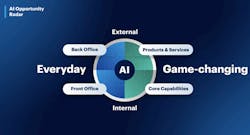Generative AI is Shifting How People and Machines Interact
The leap in generative AI (GenAI) is part of a larger shift in how humans and machines interact and needs to be included in companies' business strategies.
“We are moving from what machines can do for us to what machines can be for us. said Mary Mesaglio, Distinguished VP Analyst at Gartner, in a statement. "Machines are evolving from being our tools to becoming our teammates. Gartner predicts that by 2025, GenAI will be a workforce partner for 90% of companies worldwide.”
According to recent Gartner surveys of CEOs, CIOs are their number one choice to unlock the value of GenAI.
During the opening keynote of Gartner IT Symposium/Xpo analysts suggestion the companies prioritize two areas to unleash the possibility of AI over the next 12-24 months – decide their AI Ambition and become AI-Ready,.
Everyday AI is focused on productivity. The machine is a productivity partner. It enables workers to do what they already do faster and more efficiently. Currently, 77% of CIOs and technology leaders worldwide are focused on the opportunities of everyday AI. “It is important to note that everyday AI will go from dazzling to ordinary with outrageous speed,” said Mesaglio. “Everyone will have access to the same tools, and it will not provide a sustainable competitive advantage. Everyday AI is the new table stakes.”
Game-changing AI is focused primarily on creativity. “It doesn’t just make us faster or better. Either it creates new results, via AI-enabled products and services; or it creates new ways to create new results, such as with AI-enabled new core capabilities. With game-changing AI, machines will disrupt business models and entire industries,” said Mesaglio.
CIOs can help their CEO and CxO peers cut through AI complexity and define their organization’s AI ambition by examining the opportunities and risks of using GenAI in four areas: the back office, the front office, new products and services, and new core capabilities
Be AI-Ready
“A technology decision is not just a technology decision anymore. It is a technology, economic, social and ethical decision all at once,” said Mesaglio. “To navigate decisions about AI in their organization, CIOs and IT leaders need lighthouse principles — a vision for AI that lights the way and says what kind of human-machine relationships they will and will not accept.”
However, few organizations have established lighthouse principles or even a clear vision for AI. A Gartner survey in June 2023 of 606 CIOs and technology leaders found that only 9% of organizations have an AI vision statement in place, and more than one-third of respondents had no plans to create an AI vision statement.
To facilitate swift and safe adoption of generative AI in the next 12 months, organizations must do three things:
Establish AI-ready principles: Lighthouse principles must align with the values of the organization. The organization’s values must be the guiding light for navigating the unknowns of how humans and machines will interact.
Make data AI-ready: For data to be AI-ready, it must meet five criteria. It is secure, enriched, fair, accurate and is governed by the lighthouse principles.
Implement AI-ready security: For every positive use of AI, someone is putting that same technology to negative use. This is the dark side of AI. CIOs should prepare for new attack vectors and work with the executive team to create an acceptable use policy for public generative AI solutions.

